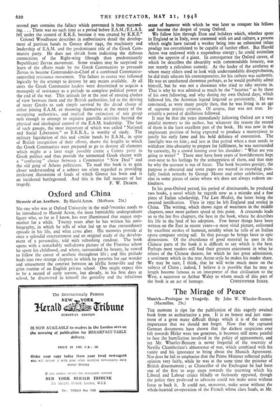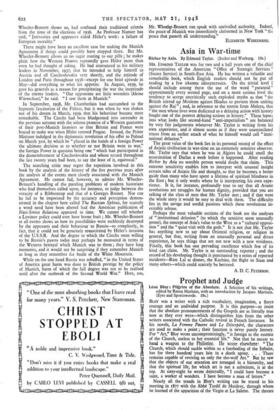The Mirage of Peace
Munich—Prologue to Tragedy. By John W. Wheeler-Bennett. (Macmillan. 25s.)
THE moment is ripe for the publication of this eagerly awaited book from so authoritative a pen. It is an honest and just state- ment of a great many difficult things which it is of the utmost importance that we should not forget. Now that the captured German documents have shown that the darkest suspicions ever felt towards Hitler were too generous, it becomes still more painful to face the humiliation involved in the policy of appeasement, and yet Mr. Wheeler-Bennett is never forgetful of the sincerity of Neville Chamberlain's abhorrence of war, which combined with his vanity and his ignorance to bring about the Munich Agreement. Nor does he fail to emphasise that the Prime Minister reflected public opinion very fairly, while he was at the same time the prisoner of British disarmament ; as Chancellor of the Exchequer he had been one of the first to urge steps towards the rearming which his Liberal and Labour critics blindly or factiously opposed, though the policy they professed to advocate could not make sense without force to back it. It could not, moreover, make sense without the whole-hearted co-operation of the French whose class feuds, as Mr.
Wheeler-Bennett shows us, had confused their traditional criteria from the time of the elections of 1936. As Professor Nastier has said, " Janissaries and appeasers aided Hitler's work: a failure of European morality."
There might have been an excellent case for making the Munich Agreement if things could possibly have stopped there. But Mr. Wheeler-Bennett allows us no sugar coating to our pills ; he makes plain how the Western Powers repeatedly gave Hitler more than even he had thought of asking. He had announced to his military leaders in November, 1937, that he intended to help himself to Austria and all Czechoslovakia very shortly, and the attitude of London and Paris. throughout 1938—except for one brief episode in May—did everything to whet his appetite. In August, 1939, he gave his generals as a reason for precipitating the war the ineptitude of the enemy leaders. " Our opponents are little wormlets (kleine Wiirmchen)," he said. " I saw them at Munich."
In September, 1938, Mr. Chamberlain had succumbed to the hypnotic fascination of the Fiihrer, but it was when he was shaken out of his dream in March, 1939, that his behaviour became most remarkable. The Czechs had been bludgeoned into surrender in the previous autumn with the solemn promise of a Western guarantee of their post-Munich frontiers so that Britain and France were bound to make war when Hitler entered Prague. Instead, the Prime Minister indulged in the diplomatic revolution of his offer to Poland on March 31st, by which he " placed in the hands of a foreign Power the ultimate decision as to whether or not Britain went to war," the foreign Power in question being one " which had participated in the dismemberment of Czechoslovakia and whose record throughout the last twenty years had been, to say the least of it, equivocal."
The searching critic may regret the repetition involved in this book by the analysis of the history of the five previous years after the analysis of the events most closely associated with the Munich Agreement. He cannot fail, however, to admire Mr. Wheeler- Bennett's handling of the puzzling problems of modem historians who find themselves called upon, for instance, to judge between the veracity of a Ribbentrop and that of a Georges Bonnet. Nor can he fail to be impressed by the accuracy and perception demon- strated in the chapter here called The Russian Sphinx, for scarcely a word need have been altered had the American publication of Nazi-Soviet Relations appeared in time. We cannot tell whether a Litvinov policy could ever have borne fruit ; Mr. Wheeler-Bennett at all events shows us how its possibilities were recklessly destroyed by the appeasers and their behaviour to Russia—so completely, in fact, that it could not be genuinely resuscitated by Hitler's invasion of the U.S.S.R. And the degree to which the Czechs seem willing to' be Russia's pawns today may perhaps be measured in terms of the Western betrayal which Munich was to them ; they have long memories, and it would not be surprising if they remember Munich as long as they remember the battle of the White Mountain.
While on the one hand Russia was rebuffed, "in the United States of America great harm was done to British prestige by the policy of Munich, harm of which the full degree was not to be realised until after the outbreak of the Second World War." Here, too, Mr. Wheeler-Bennett can speak with unrivalled authority. Indeed, the peace of Munich was immediately christened in New York " the peace that passeth all understanding." ELIZABETH WISKEMANN.



































 Previous page
Previous page